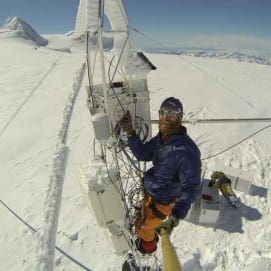
With societies and natural environments changing faster than ever, it is the individuals who have developed sophisticated adaptability and creative thinking skills that will be best prepared to confront our world’s most urgent challenges. To navigate complex decision-making environments under conditions of uncertainty, big-picture thinking with an ability to anticipate long-term consequences and collaborate with stakeholders across sectors and disciplines is increasingly necessary.
As climate change and other environmental problems escalate, an accelerated approach to both sustainability and learning is required. Experiential learning provides the extensive practice and reflection to apply theoretical concepts to real-world problem solving. It’s at the core of a Unity College education, encouraging transdisciplinary resourcefulness in finding practical, innovative, and integrative solutions to global environmental issues.
Here is how environmental Master’s programs emphasize sustainability and experiential learning to develop the problem solvers of tomorrow.
Why Environmental Masters Programs are Well Suited to Experiential Learning
In preparation for the dynamic and constantly evolving environments encountered by sustainability science and natural resource management professionals, experiential learning activities engage Master’s students in the complexities of real-life situations. With the natural world as a living laboratory, a deeper understanding of the intersection of science and society is possible.

Rather than exclusively acquiring knowledge from established sources, experiential learning enables experimentation with new behaviors and a low-risk method of learning from mistakes. In this way, students can meaningfully expand their capabilities and confidence so they may seamlessly make the transition to careers in the field. It provides both hands-on and mind-on authentic learning experiences.
Applying Experiential Learning to an Environmental Science Online Degree
While Unity College’s rural Maine location on 225 acres of fields and woodlands provides an ideal environment for adventure and discovery in the great outdoors, the new Online Master’s in Professional Science programs provide unique opportunities for more flexible and personalized study. These innovative environmental masters programs have been developed by world-class academics to combine scientific principles with the organizational and communication skills necessary for successful careers in biology, natural resource management, environmental science, and more.

It’s an ideal study path for recent graduates, or professionals in the field seeking more knowledge and applied experience in sustainability, to acquire the training and credentials necessary to advance their career path. With our state-of-the-art online learning platform, you can learn at your own pace and create your own schedule. Throughout the programs, students apply diverse course concepts to real-world ecological case studies, integrating economic models, citizen input, and systems thinking.
Experiential Learning in Capstone Projects of an Environmental Science Online Degree
During their capstone projects, students demonstrate transdisciplinary approaches to solve real-world problems. They work closely with their instructor to develop a clear proposal and methodology, conducting research and implementation in their specific field of interest. It involves generating relationships with partners or field sites, applying quantitative approaches to analyzing project data, and communicating outcomes to an audience in their career field.
Leveraging experience as a source of learning and development in an environmental science online degree involves regular active experimentation, reflective observation, and abstract conceptualization. Through this process, students explore their individual ideas in relation to local and global responses to environmental issues.
Are you interested in pursuing a Master of Environmental Science degree?
Contact Unity College Online for more information about our M.S. in Professional Science tracks.



